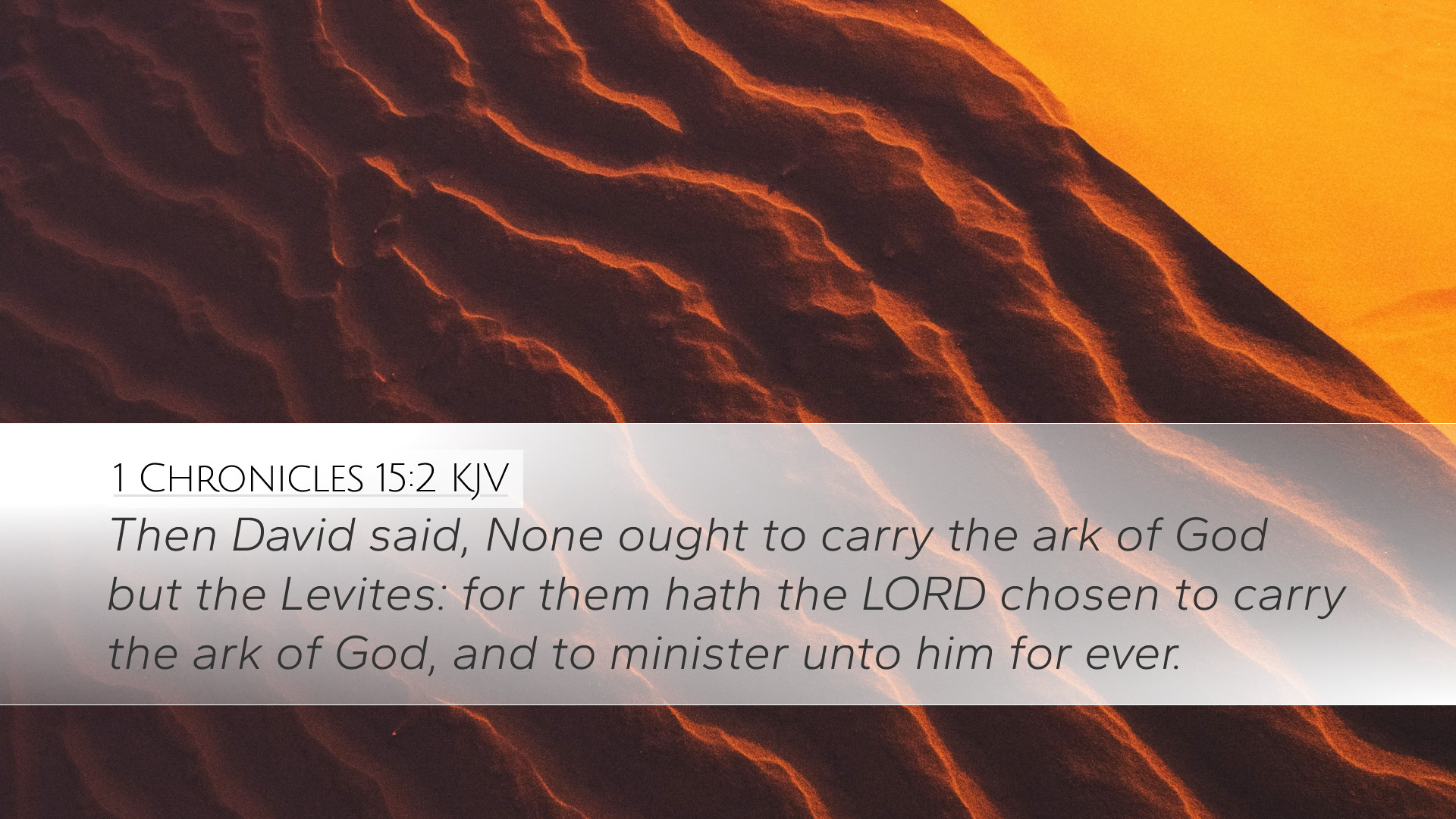Commentary on 1 Chronicles 15:2
Verse Reference: 1 Chronicles 15:2 - "Then David said, 'No one but the Levites may carry the ark of God, because the Lord chose them to carry the ark of the Lord and to minister before him forever.'
Introduction
This verse encapsulates a pivotal decision made by King David regarding the transportation of the Ark of the Covenant, emphasizing the sanctity of its handling and the divine selection of the Levites for this task. Throughout the history of Israel, the Ark represented the presence of God among His people, making it essential that it be treated with utmost reverence and care.
Contextual Background
Historical Setting: The Ark of the Covenant was a sacred object designed by God to symbolize His presence with Israel. It had been improperly handled prior to this moment, leading to severe consequences. Understanding the history of the Ark's transportation helps appreciate David's emphasis on following God's ordained instructions.
Cultural Significance: To the ancient Israelites, the Ark was not merely a symbol; it represented God's covenant with his people. Mishandling this sacred object carried both physical and spiritual repercussions.
Key Themes and Insights
- The Divine Choice of the Levites:
David asserts that only the Levites were chosen by God for the responsibility of carrying the Ark. This reflects a foundational understanding within Israel of God's ordination, which emphasized the need for purity and designated roles in worship and service.
- Importance of Obedience:
The choice of the Levites also serves as a reminder of the importance of adhering to God's commandments as laid out in the Law. It highlights the significance of following divine instruction precisely to avoid unnecessary calamity.
- Ministry of the Levites:
The Levites' role is twofold: to carry the Ark and to minister before God. This dual function underlines the relational aspect of worship; carrying the Ark involves both physical labor and spiritual responsibility.
Commentary Insights
Matthew Henry
Matthew Henry emphasizes the importance of respect for sacred things, arguing that the Levites were set apart to carry such holy objects. He notes that David's statement signifies an acknowledgment of God's order and the necessity for His servants to be consecrated for specific duties in temple service. This suggests a profound understanding of the exclusive relationship the Levites had with the Lord in their service.
Albert Barnes
Albert Barnes highlights the significance of the Levites as a tribe divinely chosen for service. He explains that in the earlier attempts to retrieve the Ark, the lack of adherence to God’s commandments led to misfortune. Barnes emphasizes that David's statement reflects a learned understanding from past failures. The Levites had a hereditary right to this holy duty, which demonstrated God’s continued grace in appointing them despite their history.
Adam Clarke
Adam Clarke adds a scholarly perspective, discussing the historical context of the Ark's transportation and the ministry of the Levites. He explains how the Ark had been handled previously by individuals not designated for this work, leading to severe repercussions. Clarke points out that David's declaration was not only about the act of transportation but also about reinstating a sense of reverence and order in worship practices among the Israelites. The Levites' service is perceived as an honor and a responsibility that demands diligence and respect.
Theological Reflections
God’s Holiness: This verse emphasizes the holy nature of God and His requirements for those who serve Him. As priests and Levites, their task was inherently spiritual, and God’s holiness required a proper approach.
Role of Leadership: David’s commitment to appoint Levites reflects the responsibility of leaders to guide their people in worship and obedience. It serves as an example of how effective leadership involves adherence to God's ordinances.
Contemporary Application: Modern readers are encouraged to examine their own church practices and the reverence with which they approach sacred objects and ceremonies. This passage calls for clarity in roles and responsibilities within the worship context to honor God's presence in the communal gathering of believers.
Conclusion
1 Chronicles 15:2 serves as a vital reminder of the need for holiness and respect in the service of God. The Levites were divinely ordained to carry the Ark, and their example challenges contemporary believers to embrace reverence in worship and to understand the weight of spiritual responsibilities. As David sought to restore order in worship, so too should modern leaders seek to align their practices with biblical directives, ensuring that all aspects of worship reflect God’s holiness and truth.


